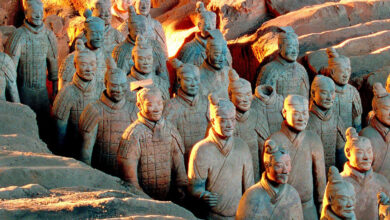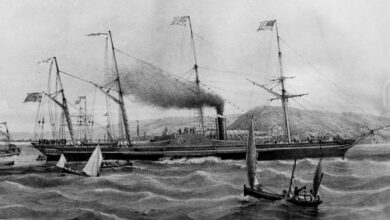The Liberation of Buchenwald: A Glimmer of Hope Amidst the Darkness
On 11 April 1945, a pivotal moment unfolded in the waning days of the Second World War as American forces liberated the Buchenwald concentration camp near Weimar, Germany. This event marked a significant chapter in the closing stages of the war and shed light on the unimaginable atrocities committed within the camp’s confines. The liberation of Buchenwald not only symbolised a beacon of hope for survivors but also exposed the depth of human cruelty, serving as a solemn reminder of the Holocaust’s horrors.
Buchenwald, established in 1937, was one of the largest concentration camps on German soil. Throughout its eight-year existence, it was a place of unspeakable suffering and death for more than 250,000 prisoners from all over Europe. Inmates, including Jews, political prisoners, Roma, Sinti, Jehovah’s Witnesses, and homosexuals, were subjected to forced labour, medical experiments, and systematic extermination. The camp’s liberation revealed the extent of the Nazi regime’s brutality, with emaciated prisoners, mass graves, and the remnants of the camp’s killing apparatus providing irrefutable evidence of genocide.
The arrival of the American soldiers from the Sixth Armored Division of the Third Army was met with mixed emotions by the survivors. Relief and joy were tempered by the grief and horror of their experiences. The liberators themselves were confronted with scenes of inhumanity that defied comprehension, profoundly impacting the soldiers and the subsequent military reports that documented their findings.
The liberation of Buchenwald served as a critical turning point, not only in the course of the war but also in the collective consciousness of humanity. It underscored the urgent need for justice and the establishment of mechanisms to prevent such atrocities from ever occurring again. The Nuremberg Trials, which followed the war, relied in part on the evidence gathered from Buchenwald and other liberated camps to prosecute key figures of the Nazi regime for crimes against humanity.
In the years following the war, Buchenwald became a symbol of the Holocaust’s horrors and a memorial site dedicated to remembering the victims and educating future generations about the dangers of hatred, bigotry, and apathy. The camp’s liberation is commemorated annually, serving as a moment of reflection on the values of human dignity, justice, and the importance of standing against oppression.
As we look back on the liberation of Buchenwald, it is a stark reminder of the darkest chapters of human history and the resilience of the human spirit. It challenges us to remember the past, to honour the memory of those who suffered, and to remain vigilant in the fight against hatred and intolerance. The legacy of Buchenwald teaches us that remembering history’s atrocities is essential to building a future founded on the principles of justice, peace, and human rights.





